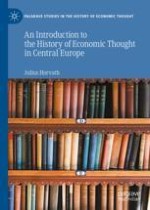2020 | OriginalPaper | Buchkapitel
5. Early Years After the Break-up of Socialism
verfasst von : Julius Horvath
Erschienen in: An Introduction to the History of Economic Thought in Central Europe
Aktivieren Sie unsere intelligente Suche, um passende Fachinhalte oder Patente zu finden.
Wählen Sie Textabschnitte aus um mit Künstlicher Intelligenz passenden Patente zu finden. powered by
Markieren Sie Textabschnitte, um KI-gestützt weitere passende Inhalte zu finden. powered by
